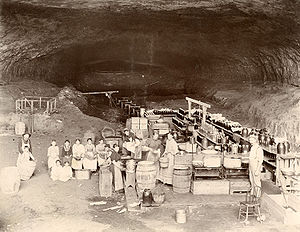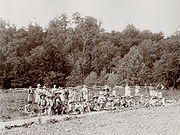
Ruskin Colony
Encyclopedia

Utopian socialism
Utopian socialism is a term used to define the first currents of modern socialist thought as exemplified by the work of Saint-Simon, Charles Fourier, and Robert Owen which inspired Karl Marx and other early socialists and were looked on favorably...
colony which existed near Tennessee City in Dickson County, Tennessee from 1894 to 1896. The colony moved to a slightly more permanent second settlement on an old farm five miles north from 1896 to 1899, and saw another brief incarnation near Waycross
Waycross, Georgia
Waycross is the county seat of, and only incorporated city in, Ware County in the U.S. state of Georgia. The population was 14,725 at the 2010 Census. A small portion of the city extends into Pierce County. According the U.S...
, in southern Georgia
Georgia (U.S. state)
Georgia is a state located in the southeastern United States. It was established in 1732, the last of the original Thirteen Colonies. The state is named after King George II of Great Britain. Georgia was the fourth state to ratify the United States Constitution, on January 2, 1788...
, from 1899 until it finally dissolved in 1901. Its regional location within the Southern United States
Southern United States
The Southern United States—commonly referred to as the American South, Dixie, or simply the South—constitutes a large distinctive area in the southeastern and south-central United States...
set it apart from many other similar utopian projects of the era. At its high point, the population was around 250. The colony was named after John Ruskin
John Ruskin
John Ruskin was the leading English art critic of the Victorian era, also an art patron, draughtsman, watercolourist, a prominent social thinker and philanthropist. He wrote on subjects ranging from geology to architecture, myth to ornithology, literature to education, and botany to political...
, the English socialist writer. A cave on the colony's second property in Dickson County still carries his name.
Origins and goals
The Ruskin Colony was originally founded by Julius Augustus Wayland (1854–1912), a newspaper editor and socialistSocialism
Socialism is an economic system characterized by social ownership of the means of production and cooperative management of the economy; or a political philosophy advocating such a system. "Social ownership" may refer to any one of, or a combination of, the following: cooperative enterprises,...
from Indiana
Indiana
Indiana is a US state, admitted to the United States as the 19th on December 11, 1816. It is located in the Midwestern United States and Great Lakes Region. With 6,483,802 residents, the state is ranked 15th in population and 16th in population density. Indiana is ranked 38th in land area and is...
. The roots of the Ruskin project can be found in the movement within American socialism at the time towards the creation of new model colonies which would, in theory, challenge the American industrial system by creating ethical alternatives built in rural settings. The idea that new settlements such as Ruskin would eventually bring forth a revolution referred to as the "co-operative commonwealth" stood in contrast to socialists who believed that it was more important to do political and social organizing within the cities, the centers of industry. According to W. Fitzhugh Brundage in the book A Socialist Utopia in the New South: "The wastefulness and ugliness of competitive individualism, so glaringly apparent in late nineteenth-century cities, would be replaced by the efficient creation and collective control of wealth and technology" in this new settlement.
Cooperative economics

Corporation
A corporation is created under the laws of a state as a separate legal entity that has privileges and liabilities that are distinct from those of its members. There are many different forms of corporations, most of which are used to conduct business. Early corporations were established by charter...
. Every colonist was then, in essence, a stockholder. The colony, with its elected board of directors, was to run much like any other company, except that it would "do all things necessary to make a success, financially and socially, of a co-operative colony." (Coming Nation, Feb. 3, 1894) Ruskin colonists manufactured and marketed pants, "cereal coffee", a vapor bath cabinet, chewing gum, belts and suspenders. The system of work itself changed little from that of the world outside Ruskin in terms of hours devoted to the various industries, however the hours, schedules and rates of pay, and industries selected were all determined by the workers. Ruskinites eventually abolished cash wages and adopted a system of script which was used in exchange for goods within the colony. In securing their economic dependence, members of the settlement also gave ample time to creative crafts, theater, and other intellectual pursuits. At one time late in the history of the colony, there even existed a band which toured southern Georgia.
Many of the products created in Ruskin were intended to supplement the income from the newspaper, Coming Nation, which was the primary source of financial stability. The majority of the colony's money and time was put into the paper, which had at its peak in 1896 around sixty thousand subscribers. Besides being the chief flow of assets, the paper also gave voice to the men and women of the colony throughout its many editors. Although Julius Wayland almost single-handedly founded the colony, he left in 1895 due to conflicts about ownership of the newspaper that ran counter to his claims of collective ownership. Under Alfred S. Edwards, who succeeded Wayland, Coming Nation included articles from the likes of George Herron, Charlotte Perkins Gilman
Charlotte Perkins Gilman
Charlotte Perkins Gilman was a prominent American sociologist, novelist, writer of short stories, poetry, and nonfiction, and a lecturer for social reform...
, and Herbert Casson (who later took up the editorial reigns after Edwards left the colony).
The eventual breakup of the Ruskin colony was due to several elements, the most problematic being the unequal distribution of membership rights of colonists complicated by the "shareholder"-type initial investment fees. Much of the blame lay in the original charter members, which had become entrenched in leadership and direction of Ruskin. One particular issue which drew ideological divisions through the colony was that of polyamorous relationships, or the practice of "free love
Free love
The term free love has been used to describe a social movement that rejects marriage, which is seen as a form of social bondage. The Free Love movement’s initial goal was to separate the state from sexual matters such as marriage, birth control, and adultery...
", within members of the colony. Ruskinites opposed to these beliefs brought harsh criticism down on those who harbored free love sympathies, which were in many ways linked to anarchist
Anarchism
Anarchism is generally defined as the political philosophy which holds the state to be undesirable, unnecessary, and harmful, or alternatively as opposing authority in the conduct of human relations...
currents that had been growing within the colony. This could be traced to Alfred Edward's editorial slant towards anarchism during his time as editor of Coming Nation.
Georgia
The colony eventually became mired in constant litigation over issues of property, with charter members who were now being pushed out of Ruskin seeking to dismantle the group through legal means. The final auction of the Ruskin Colony site at Cave Mills and most of the communal property left the remaining members with only a fraction of what they had spent five years struggling to build. The 240 members moved what they did have, which still included the newspaper and the printing apparatus for it, 613 miles on a chartered train to their new home in Georgia, where they merged with the Duke Colony in Ware CountyWare County, Georgia
Ware County is a county located in the southeast of the U.S. state of Georgia. As of 2000, the population was 35,483. The 2007 Census Estimate shows a population of 35,831 The county seat is Waycross....
and formed the Ruskin Commonwealth.
However after its first year in Georgia, the number of colonists dropped by half. The new settlement, an old lumber mill, was not surrounded by the fertile land and good sources of water that the previous location had. Ruskinites were plagued with disease, unprofitable business ventures, and a continual slide into poverty that eventually led to the auction of the property by the county sheriff to settle its debts. The Ruskin Commonwealth was effectively disbanded in the autumn of 1901.

